Without wasting any more time, let’s jump straight in.
What is a blog?
A blog is a regularly updated website where new content is frequently published, typically written in an informal or conversational style—often with the goal of attracting readers and achieving some sort of blogging goal, whether community-building or growing a business.
There’s one big point in the definition of a blog here that I’d like to point out—a blog is regularly updated. We’ll get to why that’s so important in a minute.
You most likely read blogs every day without even realizing it. You’re actually on my blog right now. Major websites like Forbes, BuzzFeed and CNN are all blogs too.
While I’m sure you’ve heard of the term blog before, do you actually know what the difference between a blog and a website is?
Unless you’ve already started a blog—or have held some other type of web-based job, you may not realize there’s a real difference between a blog and a website.
All blogs are websites, but not all websites are blogs.
What is a Blog? How a Blog is Different than a Website (Blog Definition) in 2025
- What is a Blog?
- A brief history of blogging
- How is a blog different than a website?
- Is it better to have a blog or a website?
- Key pages every blog and website should have
- Why every website should have a blog
Disclosure: Please note that some of the links below are affiliate links and at no additional cost to you, I’ll earn a commission. Know that I only recommend products and services I’ve personally used and stand behind. When you use one of my affiliate links, the company compensates me, which helps me run this blog and keep all of my in-depth content free of charge for readers (like you).
Now, I want to cut through some of the confusion and really nail down on what a blog actually is and how it’s different from making a website. The true blog definition you’re looking for 🙂
But first, if you haven’t yet gotten your blog off the ground yet, then open up my ultimate guide to starting a blog and bookmark it for coming back to (soon) after we talk through some of today’s blogging basics.
Ready to Start Your Blog Today?
Check out my ultimate guide How to Start a Blog (on the Side).
Now, let’s go over a little history of how blogging got started and where it is today.
A brief history of blogging
Blogging has been around since 1993—that’s now over two and a half decades.

While there is some debate over who the first blogger was, one man makes a compelling case.
In 1993 Rob Palmer began working for a company in London where he wrote a quarterly publication for the company and posted it on their website. Considering the World Wide Web was going open source, the company decided to continue this quarterly publication as a free online journal—or what’s now known as a blog.
While Palmer was blogging for this early online company, less than a year later, personal blogging was born by 19-year-old Justin Hall. His blog really only consisted of ramblings and links, but people (and companies) quickly took notice of the potential of this new sharing platform.
While the term “online journal” and “online diaries” can certainly be a mouthful, in 1997 Jorn Barger, an American blogger, coined the term “weblog,” which was quickly shortened to “blog.”
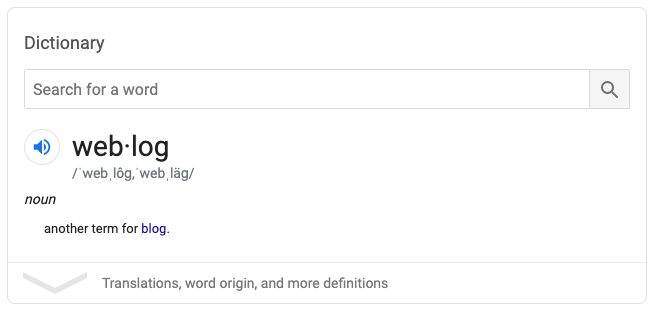
Web developers quickly began to notice that people were becoming interested in blogging—and came up with a solution.
In 1998, Open Diary was born. This platform provided people a place to share their thoughts and ideas while also allowing others to comment. More blogging platforms like LiveJournal, Blogger, Tumblr and Xanga soon emerged.
Then in 2003, blogging changed forever when two college kids developed WordPress, a content management system (CRM) that now powers over two-thirds of the Internet.
In 2007, micro-blogging emerged with the emergence of Twitter and the ideal blog post length at the time was around 300-400 words.
In 2016, Wordpress opened up the .blog domain extension, solidifying the popularity of blogging in a major way.
So here we are in 2025, with approximately 70 million new posts being published every month on WordPress. And even though the average blogger spends about three and a half hours writing a 1,500-word post, their audience reportedly only spends about 37 seconds reading it.
While a seemingly sad statistic, there are certainly ways that bloggers can increase that 37 second read time.
But that’s not the focus of our topic today…
How is a blog different than a website?
The main difference between a blog and a website, is that a blog is active (dynamically changing as new content is published) and a website is more static without regular updates.
As we covered already, all blogs are websites by definition—but not all websites are blogs.

One of the main differences, is that a website is comprised primarily of pages—such as the home page, a services page and contact page. A website can even be just one single page.
A blog, on the other hand, is comprised of both pages and posts (of which there are usually more posts than pages).
Each post is its own distinct article, most often hosted on the blog page of the greater website.
Put simply, a blog is designed around the principle of releasing regular new types of content and your typical blog layouts reflect that focus—while websites are more static and don’t usually change with regularity.
With a website, they’re generally built, published and more or less just sit there. Unless the business needs to update the website in order to do something like add new services or change their address, these static websites that aren’t as central to driving a significant amount of business remain relatively the same for long periods of time.
Blogs are very fluid web properties (which means you need to choose one of the best web hosting plans to get your blog online). Blogs are updated and changed on a regular basis with new and relevant content.
When you publish a new blog post, that most recent article often shows up in reverse chronological order, like here on my blog:
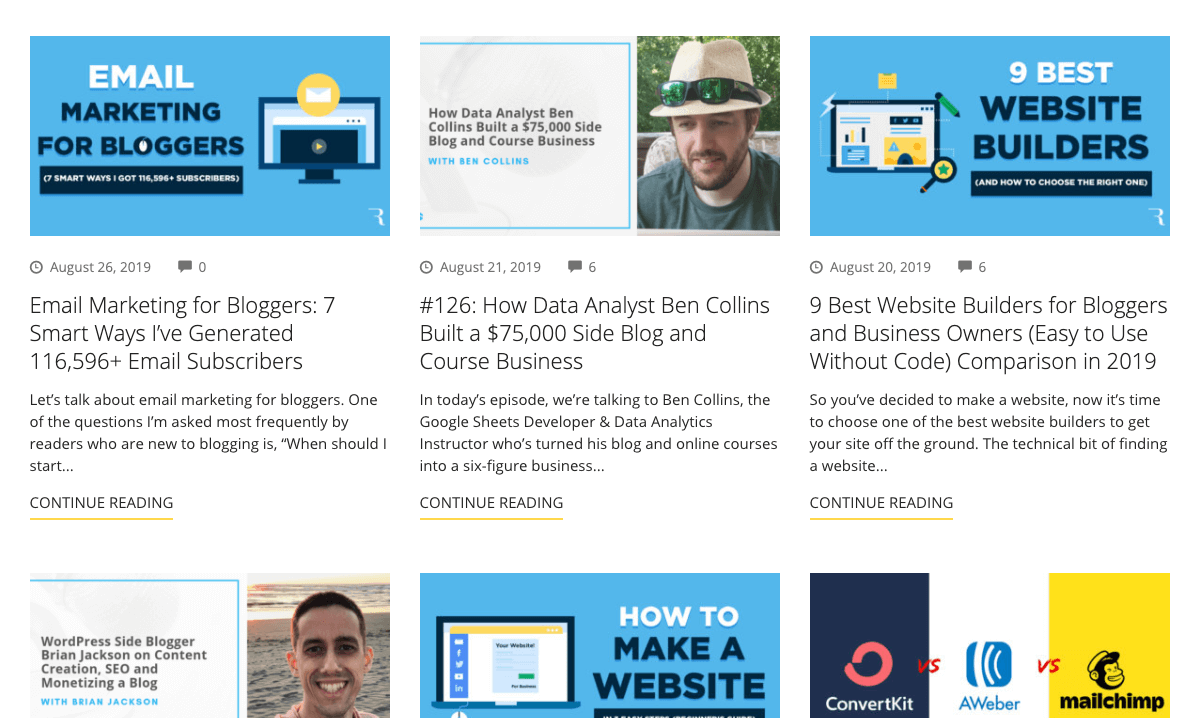
This way, your readers get your most recent content first.
That being said, there are many ways to organize your blog in order to guide your audience toward what you want them to read.
Use My 50+ Powerful Free Blogging Tools Today
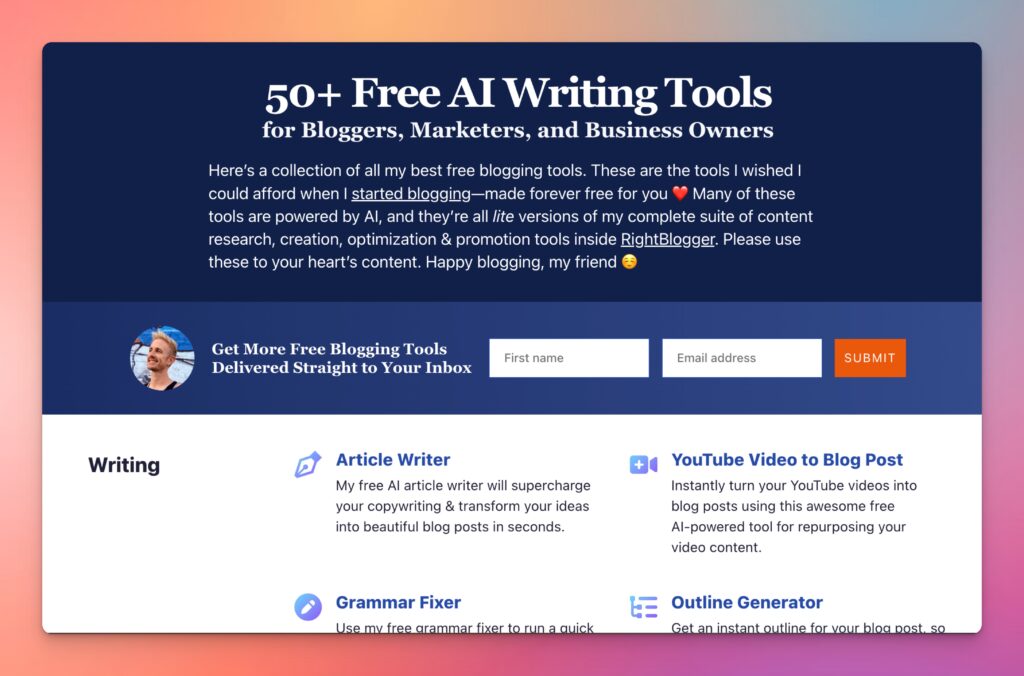
When I first started blogging, I couldn’t afford fancy tools. That sucked. And that’s why I’ve built a stable of powerful free blogging tools ranging from keyword research to an AI article writer, blog idea generator and more. Forever free for all to use—no strings attached.
Is it better to have a blog or a website?

Disclaimer: I’m a little biased when it comes to blogging. I feel that blogging is better than having a static website—in most situations. Plus, if you’re considering how much does it cost to blog as opposed to running a static website, the costs are essentially the exact same.
However, it really comes down to the business goals you have, and what your priorities will be with your digital property.
Remember when I said that websites are made up primarily of pages?
A website that only has pages is usually there to convey very specific (limited) information. That includes things like:
- Your business hours, address or menu
- A freelancer’s portfolio of work
- Your physical (or digital) products that are for sale
- Service offerings you provide and sample projects
Even with one-page websites that have a more marketing-focus, that one page should have a very specific intention too.
Often these are called “squeeze” pages that give something (like a free download) in exchange for the visitor’s email address—to later market a related product or service to them.
What are your business goals?
In order to determine whether a blog or website is better for you, start by determining what your blogging goals are.
- Are you trying to collect email addresses to build your online community? A website with a blog will be a powerful combination.
- Do you have a small local restaurant with the goal of letting people know your menu and hours? A website with a few pages should suffice.
If you have a lot of information to communicate, then a blog is your best option.
Blogging is a great way to not only interact with your existing community, but to attract new potential customers to your website (and physical location).
What’s the difference between posts and pages?
This is another common question I usually get after someone asks me… what is a blog?
And this question is natural, as blog posts and website pages can be quite similar-looking.
There are however, several differences between blog posts and the pages of your website.
Posts:
- Can be added to an RSS feed
- Are active and regularly updated
- Have several headings and subheadings
- Are archived based on month and year
- Organized based on tags and categories
- More likely to be shared on social media
- Encourage conversation through comments
- Get the author and date published on a post
- Are generally formatted the same based on your website template
- You can have an unlimited number of posts
Pages:
- Contain information that doesn’t change often
- They are not tied to specific dates
- Are not (usually) written with the intent to be shared on social
- Don’t include comments
- Hierarchical by nature (you can add sub-pages)
- Each page is often formatted somewhat differently
- Don’t include an RSS feed
- Do not have an author or publish date
- The number of pages should be relatively limited
When writing a blog post for your site, you’ll have a more in-depth process that begins with crafting a blog post outline, strategizing on a blog headline that’ll attract readers and determining the narrative arc of your content all before you even get to putting any content down. Pages are a little different.
Need Catchy Blog Title Ideas?
Try my free AI-Powered Blog Title Generator Tool to get dozens of SEO-friendly headline ideas to make your blog posts stand out today.
Now, let’s talk about the key pages every blog and website should have—regardless of your goals.
Key pages every blog and website should have
Even if you are “just blogging,” there are still several core pages that you should include on your website.

1. About page
The About Me page tells your visitors what or who your website is about.
Every company with a website—or blog—should include an about page (like mine). This helps your audience not only learn more about you and your brand, but to also make the decision of whether or not you’ll be a good fit for each other.
As a business, you can use your about page to showcase your mission and vision statements.
If you are a blogger, you can use the about page to link to your social media profiles, encourage people to follow you, tell your personal story and provide popular content suggestions.
2. Contact page
A contact page can be as simple as a contact form plugin like Gravity Forms or WP Forms, where people can reach you for business opportunities, or to simply say hi.
Or, your contact page can be used to sell your products or services (like I do).
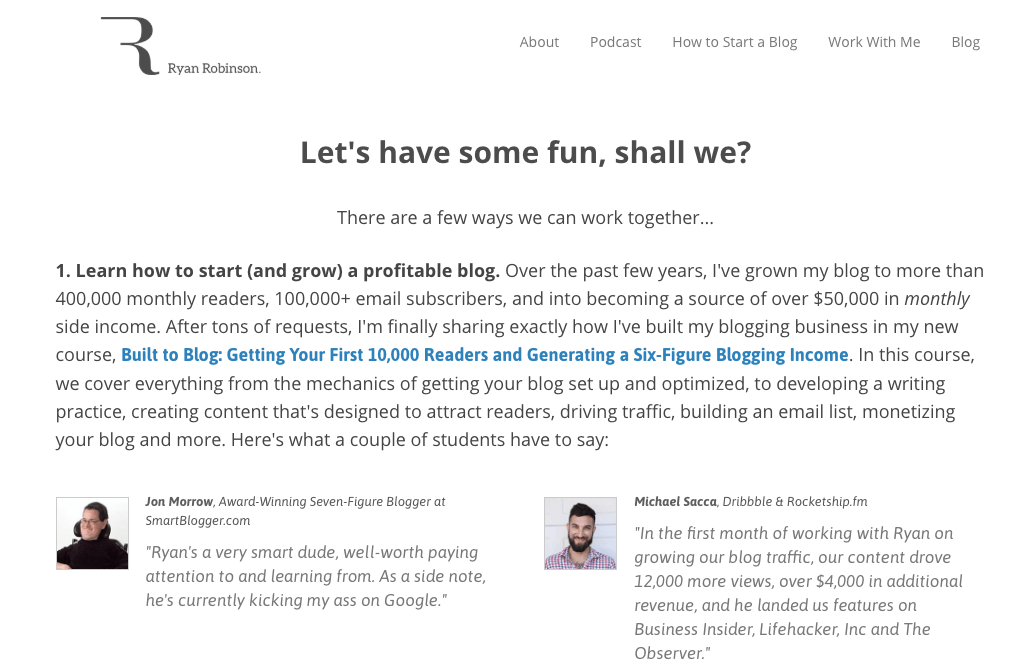
As a business, this is a great place to provide your address, email address and phone number.
Whether you’re a business or blogger though, you should make it easy for people to reach out to you.
3. Privacy policy page
You also need to let your website visitors know that you’re collecting their data (even if that data collection is anonymous through a tool like Google Analytics).
If you’re collecting email addresses or have analytics on your site, you need to make sure that you have a privacy policy page that spells that all out.
4. Terms of Service
This page is vital if you sell products, services or promote affiliate offers on your website.
This should be treated as a legal document. A Terms of Service page helps to limit your liability in the case that services or information from your site is misused.
These are the four main pages that every website should include, no matter what.
And of course, in addition to these key pages—I’m a big advocate of everyone also blogging.
Why every website should have a blog
If your website is built on WordPress (or even another of the best website builders) then you have the ability to add a blog to your site—and you should!
Here’s why: Blogging gives your website a better chance to attract more visitors.
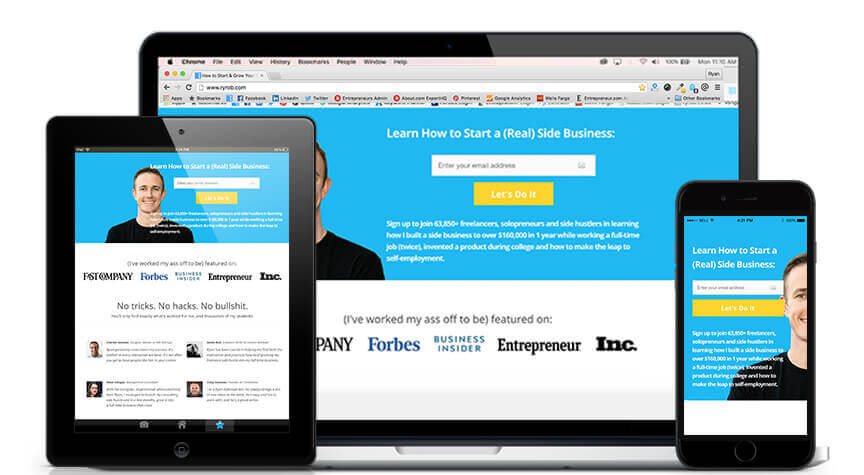
Let’s do some simple math to illustrate why having more people on your website is a win…
More (of the right) visitors = more potential customers = more revenue.
You can get more people to visit your website when you increase your traffic through tactics like search engine optimization and blogging.
1. It’s all about traffic and search engine optimization (SEO)
When you first start a blog or launch your website, people don’t just magically flock to read all of your amazing content.
One of the biggest things that new bloggers and website owners get hung up on, is how to get traffic to their sites.
When you first start out, getting traffic to your blog can seem like a really overwhelming task. But believe me, it’s not as difficult as it sounds.
I’ve already broken down 32 ways of how to get traffic to your blog (based on my experience growing this blog to 400,000+ monthly readers).
So, it’s safe to say that I know a thing or two about growing a blog. And these aren’t just surface-deep “tips” you’ve read about on major publications…
- “Share your latest and greatest post on your personal Facebook page!”
- “Tweet your new blog post every 10 minutes for the next hour.”
- “Comment on other people’s blogs and link to your own content.”
All lame.
While these quick “tips” might get you some growth to start with (or unfriended by your cousin on Facebook), they’re not long-term, sustainable strategies.
Your SEO (Search Engine Optimization) strategy is what is going to keep bringing you more traffic month after month. One of the best ways to build a stellar SEO strategy is to have a blog that publishes regular high-quality content for search engines to index and surface to their users.
If you’re new to blogging, SEO can sound like this mystical thing that only the Jedi masters know about.
While there is a bit of a learning curve, I can promise you, anyone can learn SEO. And in fact, doing so is core to putting together a smart blogging strategy that’ll stand the test of time.
One of the best tips that I can give you here, without going into too much detail on blog SEO strategies, is to focus on keyword research and user-intent.
Use My Free Keyword Research Tool
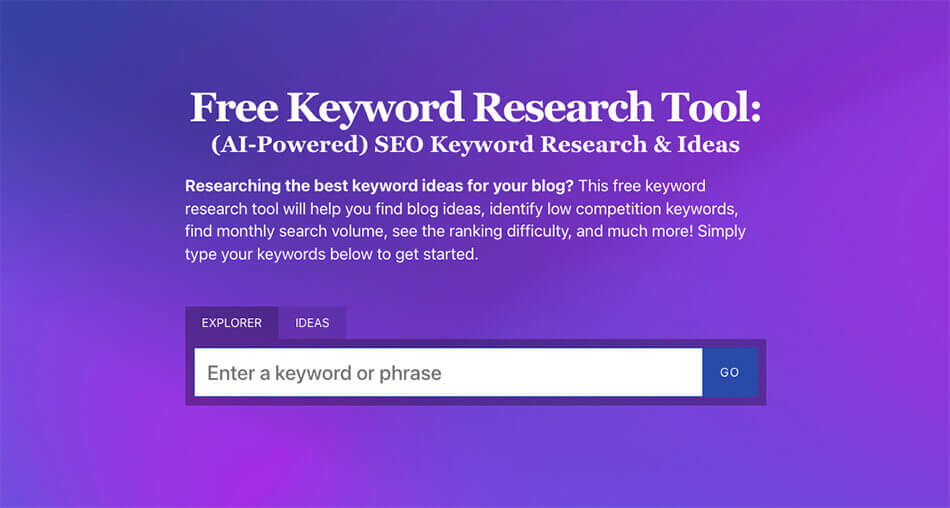
Try my free AI-Powered Keyword Tool to get dozens of research-backed ideas for keywords & topics to write about on your blog today.
Think about this for a minute… How did you find this article you’re reading right now?
I’d be willing to bet you typed into Google, something like “what is a blog?” or “what’s the difference between a blog and a website?”
It’s no accident that you landed on this page. You’re here because I did my keyword research, focused on user-intent to create a comprehensive answer to these two main questions and then worked hard to nail my blog SEO strategies.
User-intent, simply put, means that the posts that you write are meant to answer a question or solve a problem that the user has.
You can no longer just write a blog post that contains a bunch of filler content with a string of keywords at the end.
People don’t learn anything from that and major search engines like Google know you’re trying to game the system, so they won’t show that content to their users.
2. The benefits of blogging
I love blogging, and I’ve built an entire business around it.

But there are many benefits to blogging, beyond just getting your ideas out into the world.
You don’t need a product or service to get started
Unlike a website that’s centered around an already established business, you can start a blog without an existing product or service today.
While you can certainly add products and services over time (as you build up an audience), you don’t need anything other than your blog in order to get started on audience-building.
People often choose a blog name and just start writing content about their passions at first. Then after they’ve truly found their audience, they can work to develop products or services that resonate with them. Things their readers will actually want to buy.
You can also start making money from a blog without your own products or services, but more on that in a minute.
Why people start blogs (instead of websites)
Websites are great for an already established business.
They are not as great for someone just starting out that doesn’t already have a product or service to offer (let alone an audience to market to).
If you’re a wedding photographer, you can certainly start out with a static website, rather than a blog. But the fact is, that you already have an established business. You can create pages that outline your hours and services—and eventually use your website to attract new clients.
However, if you don’t have a product or service, it’s much better to start with blogging.
Perhaps you want to share your love of French cooking with the world. You don’t have a cookbook, you haven’t created a cooking course (yet), so you start sharing all of your favorite recipes, photos and recommendations on your blog.
My girlfriend Anjelica is taking this approach with her blog, Vegan Anj, where she’s sharing content like her journey through a comprehensive vegan cooking course, city guides like her vegan Chicago roundup and lists of the best vegan restaurants in Los Angeles. She’s building up her base of content and the business model will unfold in time as traffic flows in and creates more opportunities. I’ll soon be taking a similar approach with my own food blog, VeganTable.
You can draw in an audience through social networks like Pinterest and begin to collect email subscribers and generate repeat readers to learn from. I talk a lot more about finding your target audience and getting readers to your site in my guide about how to promote your blog and throughout my various blogging books.
The basics of making money blogging (vs through a website)
Now to the nuts and bolts—how websites make money versus how blogs make money.
If you have just a website (without a blog) there are a few ways that you can generate income from your website.
Most commonly—from selling the physical or digital products and services you already have (to your existing customer base) and hoping more people discover your site from either organic searches or paid advertising campaigns with search engines and social networks.
A blog, on the other hand, can make money in a lot of ways—including the above methods… while also building you that audience of potential customers along the way.
While there are many ways to make money blogging, here are five of the most straightforward:
- Advertisements
- Sponsored opportunities
- Selling services
- Affiliate programs
- Physical and digital products
Advertisements
Ads are one of the most common ways bloggers start making money relatively early on.
There is a very low barrier to entry and you don’t need a ton of traffic to generate some income (though you’ll still be responsible to pay income tax on your blog income, so check out my guide about taxes for bloggers)—albeit very small until you’re driving a hundreds of thousands of monthly readers.
That being said, if you get a lot of traffic and are part of a strong ad network, you can make good money doing little else but publishing new content.
Sponsored opportunities
Sponsorships are when a blogger collaborates with another company (for a fee) to promote their products or services.
This can be a one-off sponsored blog post like this sponsored blog post (or my compilation of Bluehost reviews)—or a continued working relationship with regular promotions over a duration of time. Although it can take some time to get sponsored opportunities, as sponsors want an ROI from their investment, so they like to see reasonable traffic and engagement stats of your readers before diving in.

Selling services
Services can be classified as anything from selling your work as a freelancer (through these blogging jobs sites) all the way to coaching people through the same career path you’ve built for yourself.
Put simply though, this is where you’re trading hours for dollars—so it’s not the most sustainable way to build a large business from your blog in the long run.
However, it can also be very lucrative, especially if you build up a raving fan base and people are banging down your door to work with you. That can justify charging a premium.
Affiliate programs
Another very easy to get started with making money on your blog, is through affiliate programs. There are affiliate programs for literally every blog niche out there that you can think of—from Wordpress plugins to obscure camping equipment that’s sold on Amazon.
The basic principle of affiliate marketing, is that you simply place a link in your blog posts referencing a product and when people purchase through your link, you earn a commission (at no extra cost to them).
Most affiliate programs have a low barrier to entry, and you often don’t need a ton of traffic in order to get started either.
But generally speaking, the more traffic you have to your blog posts, the more affiliate sales you’ll be likely to generate. Here are a few examples of articles I’ve used to earn substantial affiliate commissions from:
- My list of the best cheap hosting plans for bloggers
- This roundup of monthly hosting plans (to pay month-to-month)
- My tutorial on shared hosting, including plan recommendations
- This guide about choosing free hosting plans or going with free blogging sites
Physical and digital products
Products, both physical and digital, are also smart options to make money with through your new blog.
Digital products are a lot easier to get started with as you can make them yourself (such as an online blogging course or writing an eBook) and market it to the readers on your blog.
Physical products take a little more time and money to create brand new.
However, you can start with dropshipping, which is where you launch an online store (from a new page on your blog) and you don’t have to keep any actual inventory yourself.
You can also work with a wholesaler to develop your own brand using white label products where you just put your branding on their product.
What’ll it be?
Do you want to start a blog or make a website?
Do you already have a business that needs more exposure… or do you want to build a new business by sharing your thoughts with the world?
Either way, blogging can significantly help further your goals—check out my roundup of the most impactful blogging tips before you get started.
Ready to Start Your Blog?
Check out my ultimate guide How to Start a Blog (on the Side).

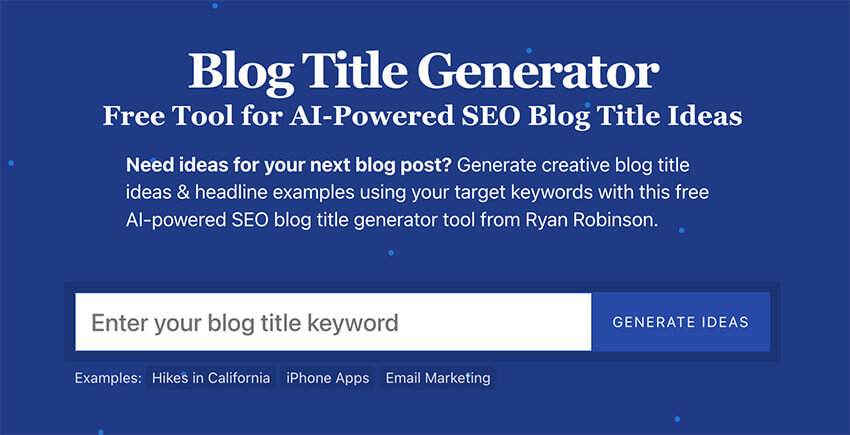
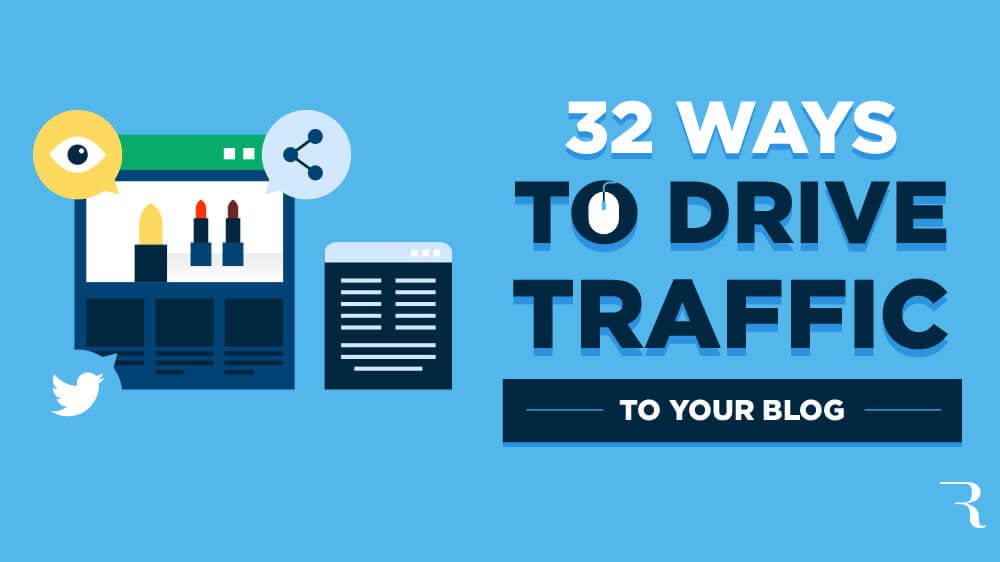
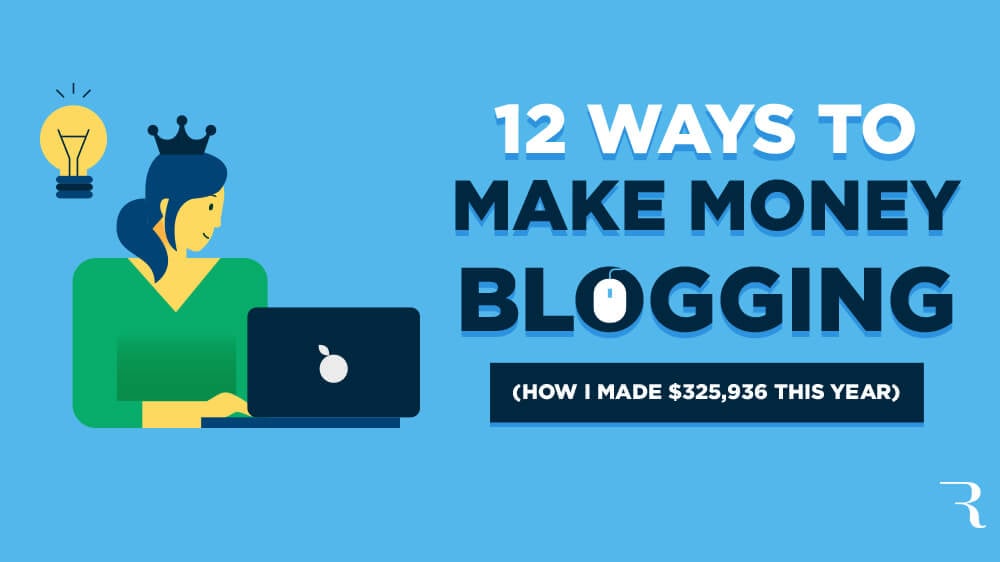
79 replies to “What is a Blog? How a Blog is Different than a Website (Blog Definition) in 2025”
Very easy manner you explain what is blog along with that you have provided the blogging history that is great and you have mentioned the difference between the blog and website. All the point you have covered I have read them and really I didn’t find such a comparative study in any other website. You shared information in a very great manner and really it is helpful for the beginner such as a me. thank you so much and keep sharing
You’re very welcome! 🙂
Thanks for explanation, nowadays maybe we confuse, whether use blog platform free or rent a website that already provides a blog in menu.
But all is good to provide information and visitor.
🙏
I wish to commence my own blogging page to share the past 10 years experience with the WA Justice system and spent 7 years in prison for a crime I was not guilty of. I was found guilty of two serious offences through trial by jury on conjectural evidence at the very best, but the most incredulous matters was the false, manufactured, tampered evidence been adduced during my trial that was known to be falsely created by all including my Barrister, who never lodged a single objection throughout my three week trial. I have considerable material, but not quite ready to commence my novel as I am still seeking a brilliant legal mind who is no longer involved or working in the WA justice system to assist me in instigating a formal charge against the Office of the Director of Public Prosecutions for an improper and unlawfully conducted trial. I have little to no money, even through I had not a single cent of unexplained wealth or earnings, the prosecution took everything I had worked for for the past 45 years of my life. I am an aged pensioner and have only just recently being able to secure some work. Your input would be appreciated if you are courageous enough to enter this space?
Wow, I’m sorry to hear about your experience—that’s truly terrible. Despite the hardships, I’m glad you’re channeling energy toward positive work and making an impact on a system that didn’t do you proper justice. My advice would be to stick with either free or very inexpensive blog platforms to build up some momentum around this subject matter… check out my roundup of free blogging sites here: https://www.ryrob.com/free-blogging-sites/
I simply want to mention that I am just all new to blogging and certainly enjoyed your content. I’m very likely to bookmark your blog. You definitely have perfect posts. Bless you for sharing with us your web site.
Glad to help, Ritesh! Good luck and please let me know if you have any questions I might be able to answer for you as you’re getting started 🙂
Gratitude about your content, Good stuff! I recently explored your website & want to praise you for relatable content. Keep up the good work!
Thank you, Ritesh! 🙏
I simply want to mention that I am just all new to weblog and certainly enjoyed your web page. I very likely to bookmark your blog. You definitely have perfect posts.
Thanks for the kind words, Ritesh!
Great material you have given us, I must say very genuine content!
🙏
Every company knows that the maximum client or customers are on the online platform and to catch these client companies, you need a website to showcase your work.
🙏
I have understood something after reading it for the first time, this is the best way to write.
Really happy to hear that, Meraj!
A very informative article, thank you. But presumably, it’s possible to have a website that publishes regular ‘news stories’ that ALSO has a blog with more evergreen, in-depth content?
You’re welcome, Michael! Possible to have news stories AND evergreen, long-form content on a single blog? Definitely. Will it dilute your effectiveness to try and be “great” at both a high volume of shorter news-style stories and balancing that with the (very different) production of longer-form, in-depth content in the early weeks, months, years with your blog? I’d argue yes. Hence why I tend to recommend either one strategy or the other, unless you have a large budget and/or a team of writers helping to pitch in on growing your traffic with the direction you move in!
You have added the value into your stuff, Awesome work! I am just reaching out because I recently published a content that might be a good fit. Either way keep up the good work.
Thanks, Kajal!
Good content Ryan ! Cheers
Thanks for the kind words, Aimé!
Solving material you have given to Google, I must say a genuine content! I am just reaching out because I recently published a content that might be a good fit. Either way Keep up the good work.
Thanks for the kind words! 🙂
SO glad I found you!
I’ve been thinking for awhile about going with WordPress for my blog. I already own the domain name (unless I end up going another direction entirely). How do I “connect” an existing domain name to WP?
SO much to consider.
It’s like naming a child 😬
SO much to learn…yikes!
Thanks,
Scarlett
I appreciate you, Scarlett! Thanks for the kind words and I’m really glad you’ve been finding my content so helpful 🙂
The short answer to your question is that you’ll just need to choose a hosting company to sign up with (I recommend Bluehost or Dreamhost most these days) and when you sign up for a hosting plan—which is the infrastructure that’ll “host” your domain name and allow it to go live on the Internet—you’ll select the option that you already have a domain name you want to use. Depending upon where your domain name was registered, there may be a transfer process involved, but the good thing about choosing a company like Bluehost or Dreamhost is that their technical support team will be able to help you through that process quickly. Then, once you’re “inside” with your web host, you’ll have the option to quickly install WordPress to run on your domain name… and boom! You’ll have a WP-powered blog.
If you want to go with Bluehost or Dreamhost, I get discounted rates for my readers if you sign up using one of the links here:
Bluehost: https://bluehost.sjv.io/Xxq6ky
Dreamhost: http://click.dreamhost.com/aff_c?offer_id=9&aff_id=1003
Keyword(s): Thank you!
🙏
It’s good
🙏
This is a useful and excellent share. Will definitely share it with people I know.
Thank you! 🤘
🙏